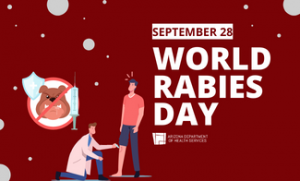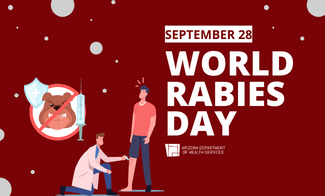 Would you know what to do if you become one of the approximately 30 people in Arizona exposed to rabies each year?
Would you know what to do if you become one of the approximately 30 people in Arizona exposed to rabies each year?
Sept. 28 is World Rabies Day, and ADHS joins partners around the globe working to raise awareness about prevention and the impact of rabies. The theme from the Centers for Disease Control and Prevention (CDC) this year is One Health, Zero Deaths, a reference to the holistic approach to rabies control by collaborating across human, animal, and environmental sectors. By embracing the “one health” approach, the CDC aims to eliminate rabies deaths in humans globally by 2030.
In Arizona, where the last fatal case of rabies occurred in 1981, the principal rabies hosts are bats, skunks, and foxes. But those animals sometimes infect other species, including dogs, cats, coyotes, horses, and cows. In 2021, a total of 83 animals tested positive for rabies.
Around the world, rabies kills more than 60,000 people every year, which is nearly one death every 11 minutes.
People who are exposed must receive a vaccine and anti-rabies serum treatment to prevent infection.
Exposure to rabid bats usually occurs when people pick up or handle a sick or dead bat. Other rabies exposures occur when people try to approach or feed wild animals, or in some cases, are attacked by rabid animals such as foxes, bobcats, and skunks.
We must all work together to prevent rabies by keeping pets up-to-date on their vaccinations and avoiding wild or unfamiliar animals even if they are sick or injured. Educate children on how to observe animals from a distance and when to seek out an adult.
The ADHS Vector-borne and Zoonotic Disease team works with local public health and animal control agencies to track domestic animal exposures, perform rabies risk assessments, and assist with post-exposure vaccine guidelines. The Arizona State Public Health Laboratory also offers no-cost rabies testing for animals if human or domestic animal exposure is involved.
To learn more about rabies in Arizona, please visit azhealth.gov/rabies.










